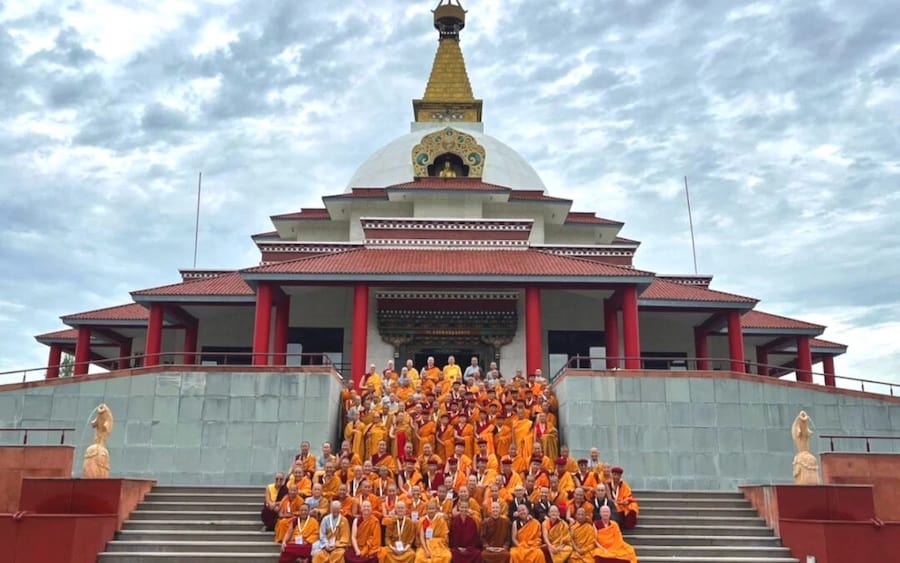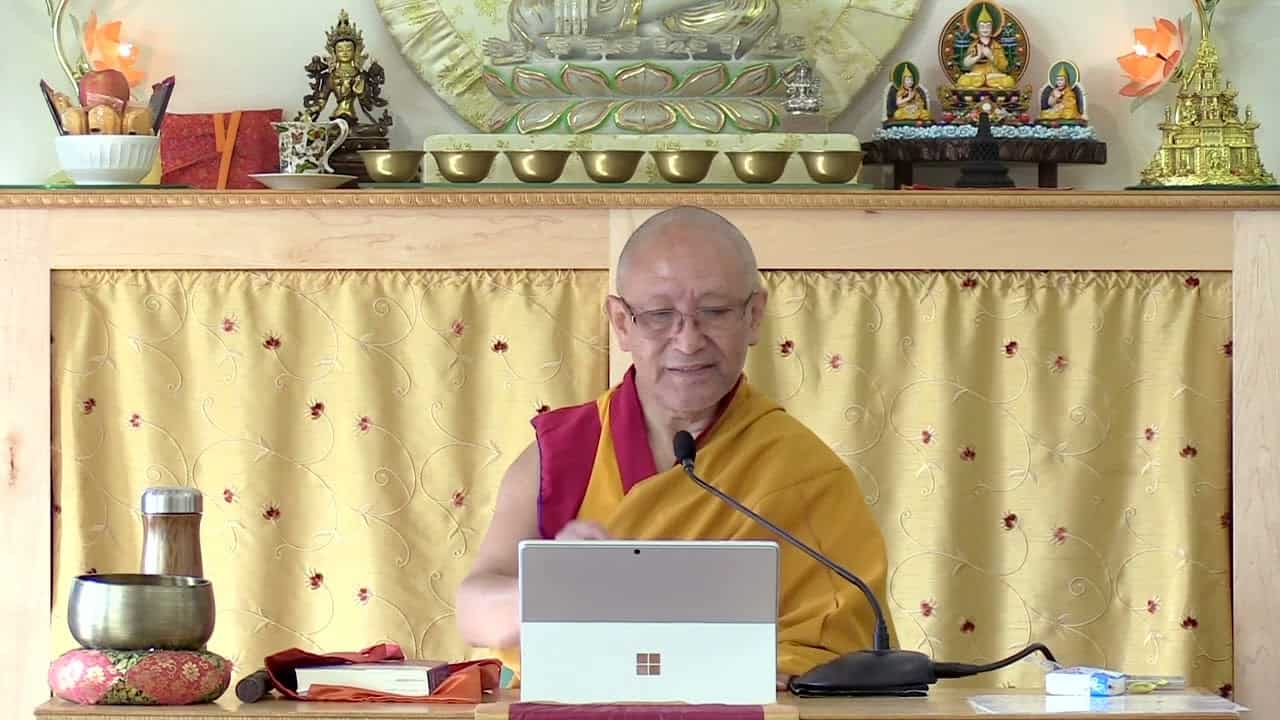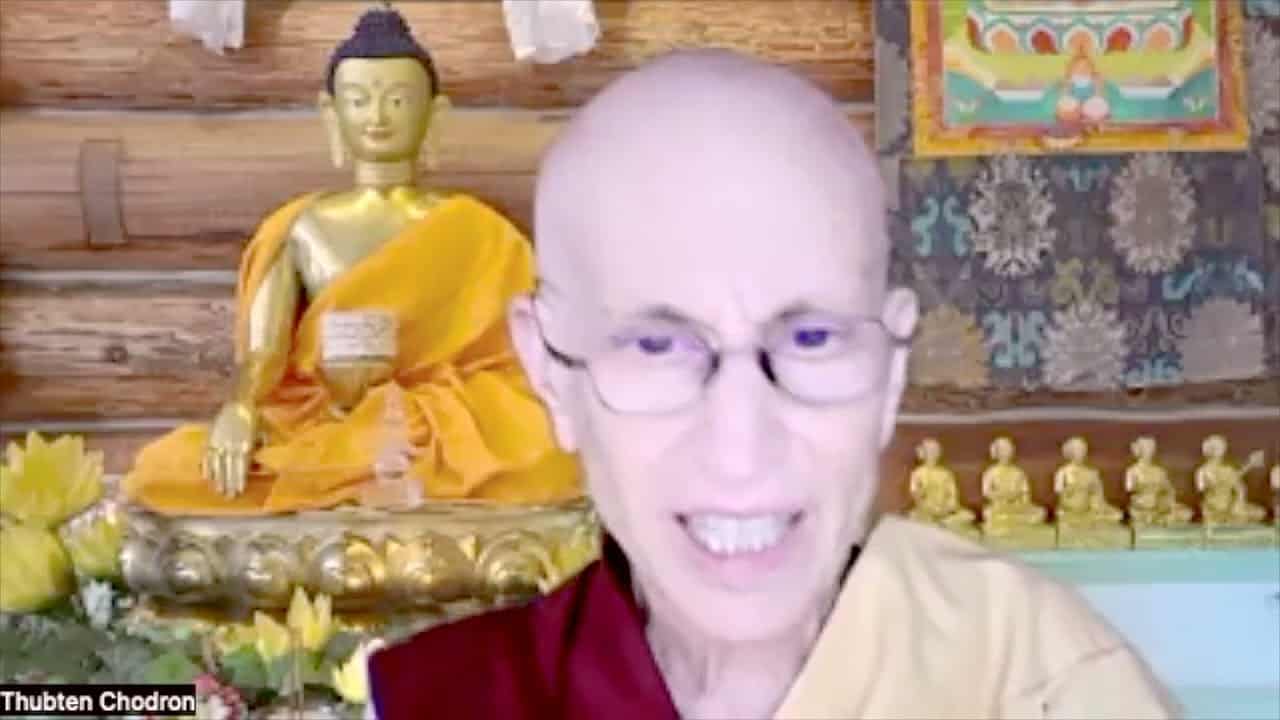Sravasti Abbey joins in the 2023 International Bhikshuni Varsa at Sravasti, India

Sravasti Abbey’s Venerable Thubten Chonyi, Venerable Thubten Damcho, and Venerable Tenzin Tsepal took part in the International Bhikshuni Varsa in Sravasti, India, from late July to mid-September, 2023.
Conceived and sponsored by His Eminence Drikung Kagyu Kyabgon Chetsang Rinpoche, the international bhikshuni varsa was held at his Great Sravasti Buddhist Cultural Centre near the holy site of the Jetavana Monastery where the Buddha spent 25 summer rains retreats and taught over 800 sutras.
For six weeks, 128 nuns from Bhutan, Nepal, India, Vietnam, Taiwan, and a few Western countries studied and practiced together, including 41 who had received the historic bhikshuni ordination in Bhutan in 2022.
Varsa
This international varsa, held during the hot, rainy weeks of Indian’s monsoon, is likely the first such gathering of nuns at this holy site in 2,000 years. Buddha himself established the annual varsa as one of the three rites a sangha community must do together each year. In ancient India, it was held during the monsoon rainy season and called a rains retreat. The Buddha also made provision for a half-varsa, a six-week period of study and practice.
During varsa, monastics study Dharma and especially focus on harmony in the community. In reviving this annual practice for modern times, the organizers wrote, “We build upon the foundational work of Sravasti Abbey and the Dharma Drum lineage, who have created vital bhikshuni (fully ordained nuns) communities with learned teachers who will guide the ceremonies and retreat.” Sravasti Abbey was honored and privileged to take part in this historic event.
2023 Varsa Program
The six-week program focused on the three higher trainings of the Buddhist path: ethical conduct, concentration, and wisdom.
Khenmo Konchog Drolma, founder and abbess of Vajradakini Nunnery, was the chief organizer. A long-time student of H. E. Chetsang Rinpoche, she began planning the event as far back as 2018, drawing on resources from the Taiwanese bhikshuni community and Sravasti Abbey.
From her connections in Taiwan, Khenmo met Venerable Guo Goang, the Vice Abbess, senior teacher, spiritual leader, and meditator from Dharma Drum Mountain in Taiwan. Ven. Guo Goang accepted the invitation to serve as abbess for the varsa and to teach on both the Vinaya (monastic ethical conduct) and on Chinese Chan meditation.
Sravasti Abbey also had a key role in the varsa. Ven. Thubten Chodron had been invited to teach as well, but health challenges prevented her journey to India. Instead, she sent Ven. Damcho, who has translated many of the Vinaya teachings and rites from Chinese into English.
Abbey nuns also taught and led the ancient rites to enter varsa, to conduct the posadha, the bimonthly confession and restoration of precepts, and the pravarana the ceremony that completes the varsa. The Abbey practices each of these prescribed rites in English, having received the transmission on how to do them from senior Taiwanese nuns.
The opening days included a beautiful procession of nuns from the Great Sravasti Centre to the ruins of the Jetavana Monastery. Chanting all the way, the group joined in prayers and recitations at the site believed to have been the Buddha’s residence.
While offering a program in five languages was not easy, all the nuns were eager to learn from each other and joyfully pitched in. Sharing a common faith in the Three Jewels, commitment to monastic life, and strong intent toward liberation and awakening, the nuns formed a happy and supportive community, with bonds that grew stronger over the six weeks.
Sila/Ethical Conduct
With its three-pronged program, the varsa began with teachings on the Vinaya, including talks on the precepts for both novice and fully ordained nuns. During this time, Ven. Guo Goang spoke on topics that included the “Six Harmonies” of well-functioning sangha communities and “Encountering Monastic Duties” and gave advice for executing the daily service that is similar in all Buddhist monasteries.
Ven. Damcho spoke on the origin of Buddhist precepts and gave a history of Buddhism’s spread, especially focusing on the nuns’ lineage. The Abbey nuns also introduced Abbey-style discussion groups, which was a new experience for most. It was heartening to watch shy nuns warm up to and eventually relish this helpful form of personal sharing that is integral to the discussions.
Concentration
The varsa continued with a one-week retreat led by Khenmo Drolma based on a program designed by H.E. Chetsang Rinpoche called “The Sravasti Curriculum.” As he traveled and taught around the world, Rinpoche has observed something lacking in modern Buddhist practice. Many Buddhists focus on accumulating ngondro (preliminary) practices and studying Buddhism. They attend many high teachings on Mahamudra and Dzogchen. However, they don’t necessarily touch the essence of Buddha’s teachings.
To remedy this, H.E. Chetsang Rinpoche developed a program based on the 16 breaths from the Anapanasati Sutra as a framework for growing in meditation. Khenmo Drolma skillfully imparted this program giving teachings and guiding meditations.
Nuns also learned to support their meditations with certain yogic exercises from the Six Yogas of Naropa, Tai Chi, and yoga to cleanse the channels and clarify the mind. Rinpoche taught these via short video clips. For seven days, the temple grew quieter and more serene as the community listened, reflected and meditated on the 16 breaths. This teaching was especially valuable for some of the Himalayan nuns whose nunneries offer full schedules of study, debate, and service, but little training in concentration meditation.
Wisdom
After a rest day, the group began a second one-week retreat with Venerable Guo Goang on Silent Illumination, a shamatha/vipassana practice found in Chan Buddhism. She began with a fascinating historical overview of the eight major schools of Chinese Buddhism, then methodically taught how to regulate body, speech, and mind for meditation, including posture, noble silence, and shamatha instruction.
When the nuns’ minds were suitably stilled, Ven. Guo Goang masterfully introduced the Silent Illumination method of shamatha/vipassana. For many, Ven. Guo Goang’s impeccable comportment and subdued manner was the greatest teaching.
Closing ceremonies
In the final week, nuns learned and rehearsed the final varsa ceremonies. Ven. Tsepal explained how to do them, led a discussion on how to give and receive feedback, and met with language groups individually to make sure they understood the format of the ceremonies. By the end of the varsa, these rituals could be performed with amazing harmony and joy.
In the closing ceremonies, Rinpoche and the Vinaya Master, Khenchen Nyima Gyaltsen, repeatedly praised the nuns for enduring the hardships of monsoon heat and rain. The varsa ended with a beautiful ceremony, the giving of certificates and gifts, and a final walk to Jetavana Grove, ancient ruin of the original Sravasti monastery, to make light offerings with H. E. Chetsang Rinpoche.
For more information:
Sravasti Abbey website:
Sravasti Varsa Begins in India
Sravasti Nuns at the Sravasti Varsa
Dharma Drum International News:
Dharma Drum Mountain Was Invited to Lead the Summer Retreat in India
Sravasti Abbey YouTube Channel:
Making History at the International Bhiksuni Varsa
Opening Rites: Historic International Nuns’ Varsa at Sravasti
Reviving the Original Sravasti
Vajradakini Nunnery website:
Mahayana Nuns Invited to International Sravasti Varsa
Facebook:
His Holiness Chetsang Rinpoche’s Speech to Welcome the Varsa
Radio Free Asia (in Tibetan):
Tibetan Varsa News Report
Venerable Thubten Chonyi
Ven. Thubten Chonyi is a nun in the Tibetan Buddhist tradition. She has studied with Sravasti Abbey founder and abbess Ven. Thubten Chodron since 1996. She lives and trains at the Abbey, where she received novice ordination in 2008. She took full ordination at Fo Guang Shan in Taiwan in 2011. Ven. Chonyi regularly teaches Buddhism and meditation at the Unitarian Universalist Church of Spokane and, occasionally, in other locations as well.


